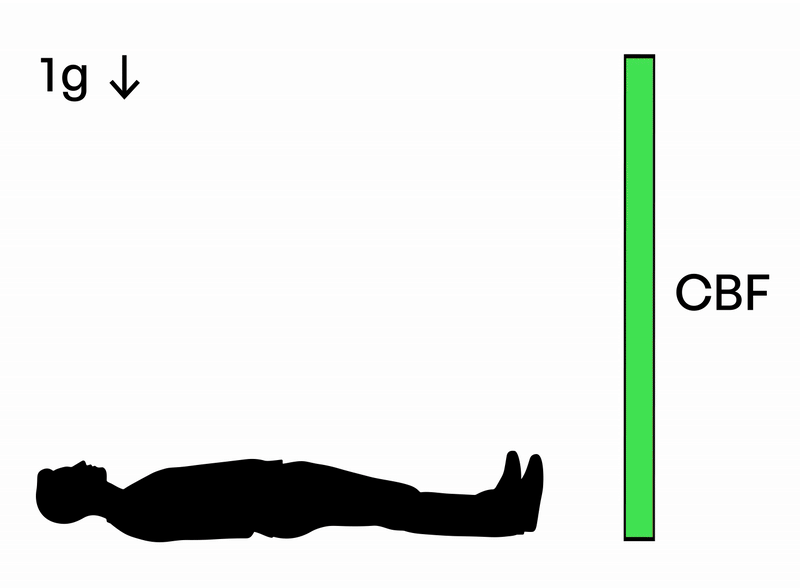The Gravity Aging Hypothesis
TL;DR
- Due to gravity, there is a chronic reduction in brain flow during the approximately 16 hours we spend upright every day.
- Deep brain structures such as the hypothalamus and brainstem, which regulate heart rate, breathing, temperature, hormones, inflammation, and immune response, are especially vulnerable to this cumulative reduction.
- Long-term reduction in blood flow to these areas contributes to neurodegeneration, systemic dysregulation, and faster aging.
- Counteracting the negative impact of gravity could help slow systemic aging without the need for pharmacological interventions.
How exactly does this work?
The brain is the body’s master regulator of aging. In addition to holding our consciousness, our brain governs the autonomic and neuroendocrine systems, which are command networks that keep every organ in balance.
For roughly two-thirds of every day, gravity pulls blood away from the brain. Even a 10% reduction in cerebral blood flow (CBF) during upright posture, compounded across decades, causes chronic underperfusion. Parts of the hypothalamus and brainstem, supplied by perforating vessels with little backup circulation, are especially at risk. When these blood capillaries fall below their critical closing pressure, neurons slowly starve, eroding the brain’s command centers and driving aging throughout the body.
CBF declines by 0.3–0.74% each year, resulting in a 20-40% loss between ages 20 and 80. As autoregulation and baroreflex sensitivity decline, the brain becomes less capable of buffering gravitational dips. Low CBF nearly doubles all-cause mortality risk, independent of heart health. As these control regions degrade, the systems they govern, such as autonomic, hormonal, and immune, spiral into dysfunction.
Brain aging becomes body aging.

Gravity vs. everything else.
Many factors reduce brain perfusion. For example, stress, pollution, poor diet, dehydration, inactivity – but these vary by individual. Gravity does not. It is the only constant, omnipresent force acting on every human, every day, across a lifetime. It’s the most stable and chronic driver of underperfusion, the quiet baseline stress amplifying all others.
Counteracting gravity.
We can fight gravity’s long game through three key layers of intervention:
- Build vascular reserve – long-term capacity through inversions, exercise, hot/cold exposure, breathwork, angiogenesis, and capillary growth.
- Keep daily flow high — hour-to-hour habits like posture, hydration, and movement.
- Nourish the system — foods and supplements that support nitric oxide, omega-3 balance, and vascular tone.
Together, they form a practical framework to maintain healthy cerebral perfusion. (For more details, see the CBF Cheatsheet)
What’s new and substantial about the Gravity Aging Hypothesis?
Science has spent decades studying what happens to the human body in microgravity in space. Yet no one has connected it to how we age here, under 1G, across a lifetime.
This hypothesis integrates existing models, suggesting that gravity-induced cerebral hypoperfusion may be an upstream factor accelerating many of the molecular and metabolic hallmarks of aging. We don’t claim that gravity is the only reason we age, but it may be the most important one, and one which isn’t yet recognised as such.
We suggest that gravity’s constant opposition to cerebral blood flow sets a physical ceiling on how well the brain can nourish itself over time. If blood flow determines the vitality of the brain’s command centers, then CBF becomes the most direct upstream biomarker linking our daily habits like movement, sleep, diet, and posture to the health of the entire body.
Some people may wonder, if gravity causes aging, why do astronauts show accelerated biological aging in microgravity? Even though this may seem paradoxical, humans evolved for life at 1G – not microgravity or hypergravity. Aging in astronauts happens for different reasons: loss of mechanical loading, fluid redistribution, and radiation. The real challenge isn’t escaping gravity; it’s learning how to live longer within it.
Preserving and enhancing CBF could protect the hypothalamus and brainstem, keeping the body’s control systems intact for longer, and in doing so, slow the overall pace of aging. If we learn to counteract gravity’s effect while still living within it, we might extend healthy lifespan, potentially by years or decades, by keeping the brain’s command centers nourished and functional.
Disclaimer: The views expressed are the author’s alone and are for informational purposes only. Do your own research and draw your own conclusions. This is not medical advice, and the author makes no medical claims. Always consult a qualified physician before changing your lifestyle or attempting any intervention.